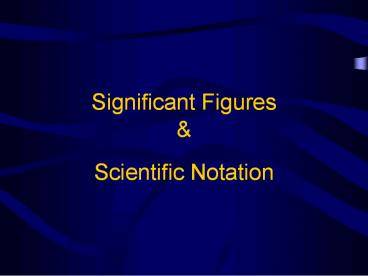Significant Figures - PowerPoint PPT Presentation
1 / 18
Title:
Significant Figures
Description:
Significant Figures & Scientific Notation Significant Figures Scientist use significant figures to determine how precise a measurement is Significant digits in a ... – PowerPoint PPT presentation
Number of Views:155
Avg rating:3.0/5.0
Title: Significant Figures
1
Significant Figures
- Scientific Notation
2
Significant Figures
- Scientist use significant figures to determine
how precise a measurement is - Significant digits in a measurement include all
of the known digits plus one estimated digit
3
For example
- Look at the ruler below
- Each line is 0.1cm
- You can read that the arrow is on 13.3 cm
- However, using significant figures, you must
estimate the next digit - That would give you 13.30 cm
4
Lets try this one
- Look at the ruler below
- What can you read before you estimate?
- 12.8 cm
- Now estimate the next digit
- 12.85 cm
5
The same rules apply with all instruments
- The same rules apply
- Read to the last digit that you know
- Estimate the final digit
6
Lets try graduated cylinders
- Look at the graduated cylinder below
- What can you read with confidence?
- 56 ml
- Now estimate the last digit
- 56.0 ml
7
One more graduated cylinder
- Look at the cylinder below
- What is the measurement?
- 53.5 ml
8
Rules for Significant figuresRule 1
- All non zero digits are ALWAYS significant
- How many significant digits are in the following
numbers?
- 3 Significant Figures
- 5 Significant Digits
- 4 Significant Figures
- 274
- 25.632
- 8.987
9
Rule 2
- All zeros between significant digits are ALWAYS
significant - How many significant digits are in the following
numbers?
3 Significant Figures 5 Significant Digits 4
Significant Figures
504 60002 9.077
10
Rule 3
- All FINAL zeros to the right of the decimal ARE
significant - How many significant digits are in the following
numbers?
3 Significant Figures 5 Significant Digits 7
Significant Figures
32.0 19.000 105.0020
11
Rule 4
- All zeros that act as place holders are NOT
significant - Another way to say this is zeros are only
significant if they are between significant
digits OR are the very final thing at the end of
a decimal
12
For example
How many significant digits are in the following
numbers?
- 1 Significant Digit
- 3 Significant Digits
- 6 Significant Digits
- 2 Significant Digits
- 1 Significant Digit
- 0.0002
- 6.02 x 1023
- 100.000
- 150000
- 800
13
How many significant digits are in the following
numbers?
- 0.0073
- 100.020
- 2500
- 7.90 x 10-3
- 670.0
- 0.00001
- 18.84
- 2 Significant Digits
- 6 Significant Digits
- 2 Significant Digits
- 3 Significant Digits
- 4 Significant Digits
- 1 Significant Digit
- 4 Significant Digits
14
Scientific Notation
- Scientific notation is used to express very large
or very small numbers - I consists of a number between 1 10 followed by
x 10 to an exponent - The exponent can be determined by the number of
decimal places you have to move to get only 1
number in front of the decimal
15
Large Numbers
- Write the number 39923 in scientific notation
- First move the decimal until 1 number is in front
3.9923 - Now at x 10 3.9923 x 10
- Now count the number of decimal places that you
moved (4) - Since the number you started with was greater
than 1, the exponent will be positive - 3.9923 x 10 4
16
Small Numbers
- Write the number 0.0052 in scientific notation
- First move the decimal until 1 number is in front
5.2 - Now at x 10 5.2 x 10
- Now count the number of decimal places that you
moved (3) - Since the number you started with was less than
1, the exponent will be negative - 5.2 x 10 -3
17
Scientific Notation Examples
Place the following numbers in scientific
notation
- 99.343
- 4000.1
- 0.000375
- 0.0234
- 94577.1
- 9.9343 x 101
- 4.0001 x 103
- 3.75 x 10-4
- 2.34 x 10-2
- 9.45771 x 104
18
Going from Scientific Notation to Ordinary
Notation
- 3 x 106
- 6.26x 109
- 5 x 10-4
- 8.45 x 10-7
- 2.25 x 103
3000000 6260000000 0.0005 0.000000845 2250































